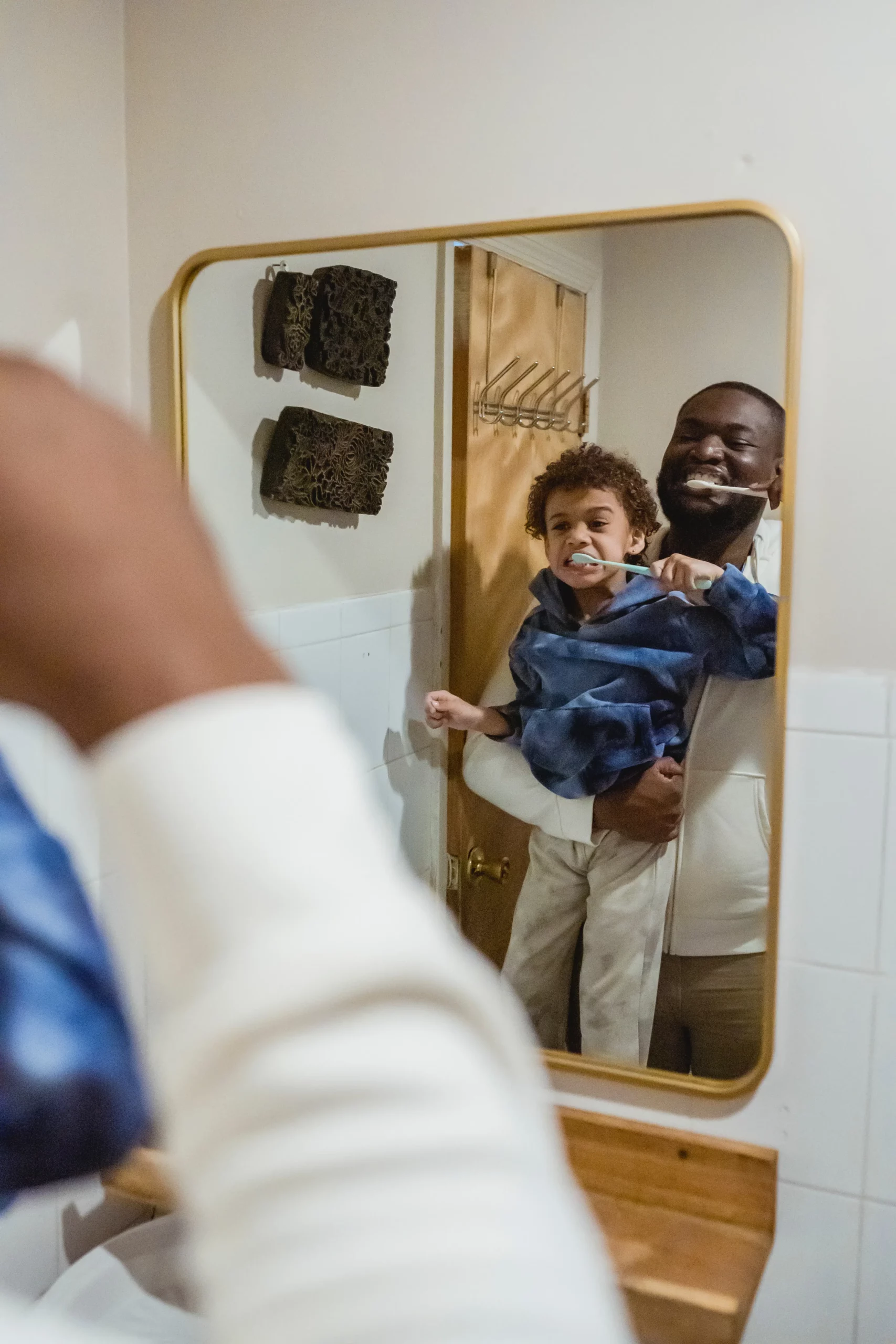Convenient Locations Serving Allston & Brighton, MA
Unlike traditional partial dentures, Dr. Bidabadi creates partials without metal or wires, offering a more beautiful and natural appearance to your smile.
Why Should I Choose No Wire Partials?

If you are missing several teeth, to the extent that a dental bridge is not sufficient, partial dentures may be the right treatment option for you. Partials are removable.
No-wire partials are lightweight, made without metal and are virtually unnoticeable.
No-wire partial dentures improve upon old designs in that they will not damage your existing teeth or healthy gums.
How Are No-Wire Partial Dentures Different?
Traditionally, partials use bent wires that look like paper clips that help the partials latch onto the adjacent teeth in order to hold in place. This can sometimes lead to discomfort, and patients often require the use of creams and powders to help their partial dentures stay in place.
No-wire partial dentures are removable and are made of flexible material that is durable and hard to break. Recent advancement in dental technology uses nylon to replace the usual metal and pink acrylic that is used for dentures. When used for partial dentures, nylon resembles the pink color of the gums and can still be durable even if a thin portion is used for both the base and the clasps. These clasps curl comfortably to the necks of the teeth making them look invisible.

These types of partial dentures are very stable and don’t use your natural teeth to latch on to. Unlike partial dentures with metal clasps, the structure and fit does not change over time.
What are the Advantages of a No Wire Partial Denture?
There are several advantages you can gain with a no wire partial denture. Examples include:
- This flexible denture is BPA-free.
- The no wire denture has no metal, so cannot cause allergic reactions.
- The lightweight, flexible partial is more comfortable than a traditional partial.
- You may get accustomed to your no wire denture more quickly than you would a traditional partial.
- Flexible partial dentures are durable and long-lasting. There's very little risk of breakage.
- The no wire partial denture looks so lifelike that no one may know some of your teeth aren't natural!
How Do I Take Care Of My Partial Dentures?

Like any other dental device, partial dentures require care and maintenance.
When wearing partial dentures, you are advised not to position them into the mouth by using your bite. Use your hands when doing so. The jaw can be really strong and the pressure of a bite could greatly affect the framework of a partial when it is not in its exact position. It could be bent or broken and could even injure your gums or tongue in the process.
Do not tighten the partial’s clasps on your own. It is not advisable to do so without the appropriate knowledge and expertise about the procedure. If you feel the partial dentures are loosening, bring them to your dentist and let an expert do the job.
You should not take your partials out of your mouth for more than a few weeks or a month. If you don’t wear your partial for too long, your remaining teeth may gradually shift to a different position. Partial dentures are placed and clasped on your remaining teeth precisely so that they resemble the natural contour of your teeth. Even the slightest disturbance in the alignment could cause complications.
Dr. Bidabadi personalizes your partial dentures to help ensure a comfortable and precise fit. With regular checkups, repairs and adjustments, you’ll discover how partial dentures can enhance your appearance and improve the quality of your life.
Who Is Not a Candidate for No Wire Partial Dentures?
While dentures are typically the number one solution for replacing missing teeth, there are some cases where patients may not qualify for no wire partial dentures. If you have poor gum health, periodontal disease, or lack the jawbone structure to support the dentures, this treatment may not be suitable for you. With these oral conditions, there can be a high risk of more of the patient’s teeth falling out if dentures are forced in. To determine your eligibility for no wire partial dentures, schedule a consultation with Dr. Nazila Bidabadi by clicking here.
What Is The Process for Getting No Wire Partial Dentures?
Getting no wire partial dentures can be a prolonged process, but it will benefit patients who are patient and committed to restoring their full smile. The process for this treatment can sometimes take up to eight weeks. Because each partial denture is fitted to every patient’s unique gums, jaw, and teeth, customizing, fitting, and manufacturing your dentures can take several weeks before Dr. Bidbadi and the patient agree on the perfect fit. If a patient requires a tooth extraction during this procedure, it may take an extra few weeks for their gum tissue to heal before placing your partial dentures in. However, because each procedure will be customized to each patient, this timeline and process can vary.
What Can I Use to Hold My No Wire Partial Dentures in Place?
If you find that your dentures are not staying in place, there are multiple methods you can take to ensure they don’t move around in your mouth when it’s not necessary. While most patients use dental adhesives that can be easily applied to the base of each denture, other patients may also use powders, wafers, or creams to keep their dentures in place. Dr. Bidbadi will be happy to recommend the best method for holding your dentures in place, depending on your personal preference and needs.
When wearing partial dentures, you are advised not to position them into the mouth by using your bite. Use your hands when doing so. The jaw can be really strong and the pressure of a bite could greatly affect the framework of a partial when it is not in its exact position. It could be bent or broken and could even injure your gums or tongue in the process.
Do not tighten the partial’s clasps on your own. It is not advisable to do so without the appropriate knowledge and expertise about the procedure. If you feel the partial dentures are loosening, bring them to your dentist and let an expert do the job.
You should not take your partials out of your mouth for more than a few weeks or a month. If you don’t wear your partial for too long, your remaining teeth may gradually shift to a different position. Partial dentures are placed and clasped on your remaining teeth precisely so that they resemble the natural contour of your teeth. Even the slightest disturbance in the alignment could cause complications.
Dr. Bidabadi personalizes your partial dentures to help ensure a comfortable and precise fit. With regular checkups, repairs and adjustments, you’ll discover how partial dentures can enhance your appearance and improve the quality of your life.
Can I Eat Normally with a No Wire Partial Denture?
Once you get used to your new partial denture and the initial soreness has passed, you can expect to eat normally with your denture in. Until that time, which can take some weeks, you want to take it slow. Initially, after your flexible denture is placed, you may feel most comfortable eating soft foods like soups, soft-cooked vegetables, eggs, and pasta. As you get used to your partial denture, you can begin adding in foods that need some chewing. It's best to cut denser foods like steak into bite-sized pieces at first. Dr. Bidabadi may recommend that you avoid chewing on sticky, crunchy, or hard foods while wearing your denture. These foods might cause damage to your artificial teeth.
Is There Anything I Should Do While Getting Used to My No Wire Partial Denture?
We want your transition into your denture-wearing days to be as comfortable and stress-free as possible. A few tips might help you get used to your no wire denture more easily.
First, know that you may salivate more when you first get your partial denture. This happens because your mouth is getting used to something foreign. If you find the extra salivating to be frustrating, you might do salt-water rinses. Rinsing the mouth with warm salty water every other day can soothe this side effect and also help reduce any soreness you might experience during your first week with your new partial denture.
If soreness is noticeable, you can take an over-the-counter pain reliever following the label guidelines. You shouldn't be too uncomfortable during your short acclimation period after receiving your no wire denture. If you experience significant or prolonged pain, please contact the office so Dr. Bidabadi can evaluate your condition.
Patient Testimonial
"The kindest staff you’d want to taking care of you and your teeth! I felt rushed and stressed this morning trying to find a dentist office that takes my insurance for this new problem with my gums, and not only did they take me in same day, they made me feel at ease throughout the appointment and took the time to make sure I understood what was going on with my gums. As someone who works in healthcare and was having a bad start to her day, thank you for treating me like a person rather than a number."
Book a No Wire Partials Consult with Dr. Bidabadi!
Contact renowned Massachusetts cosmetic dentist Dr. Nazila Bidabadi today to learn more about No Wire Partials, or to determine whether you are a candidate for the procedure. Call 617.782.9250 for our Brighton office, or 617.332.8146 for our Newton office. You can also click here to send our staff an appointment request form. Dr. Bidabadi and her team look forward to serving you!
